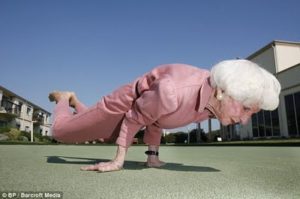
Pelvic floor muscle exercises can help both men and women who leak urine by making the muscles that hold urine in the bladder stronger.
How To Do Pelvic Floor Muscle (Kegel) Exercises.
- Tighten the pelvic muscles that you use to prevent gas from escaping.
- Continue tightening the muscles going to the front of the pelvic area.
- Hold for 5 to 10 seconds before releasing. (If 5 seconds is too long, hold for as long as you can. Over time, try to hold longer until you reach 5 seconds.)
- Repeat 5 to 10 times. (If you can’t do 5 sets, start with 1 or 2. Over time, try to increase to 5.)
- Also practice contracting and relaxing the pelvic floor muscles quickly for 10 seconds. (If 10 seconds is too long, start with less time.) Do this 5 to 10 times. (If you can’t make it to 5 sets, start with fewer sets.)
Try to do the exercises three times a day: in the morning, in the afternoon, and at night. If you can’t fit in the exercises three times each day, do as much as you can. Any amount of pelvic floor muscle exercises is better than none.
You can check to see if you are doing the pelvic floor muscle exercise correctly. When you are on the toilet, see if you can tighten the pelvic floor muscles to stop the flow of urine. These sorts of exercises are recommended by https://www.advancedurology.com to help you have a healthy bladder later in life!
For people who have trouble doing pelvic floor muscle exercises, biofeedback may help. Biofeedback uses sensors to take information about something going on in your body and share it with you in a way you can see, hear, or understand. For example, biofeedback can tell you when you flex your pelvic floor muscles. Since you cannot see your pelvic floor muscles, many people find that biofeedback helps them learn how to do pelvic floor muscle exercises. You can also purchase some tools to use at home which can help. Most kegel apparatus can be found in adult stops. There are opportunities to buy these tools online at an adult shop that accepts Afterpay too. You shouldn’t be ashamed about buying anything that’s going to improve your health.
Aging. As you get older, the bladder changes. The elastic bladder tissue may toughen and become less stretchy. A less stretchy bladder cannot hold as much urine as before and might make you go to the bathroom more often. The bladder wall and pelvic floor muscles may weaken. Weak bladder wall muscles may make it hard to empty the bladder fully. Weak pelvic floor muscles may make it hard to hold urine in the bladder, which may cause urine to leak.
Some medicines may make it more likely for your bladder to leak urine. For example, medicines that calm your nerves so you can sleep or relax may dull the nerves in the bladder. If the nerves are dulled, they may not be able to tell the brain when the bladder is full and you may not feel the urge to go to the bathroom. Without this urge, you may not empty the bladder when needed and the bladder may overflow.
Caffeine can bother the bladder and change how your bladder tells you when you need to urinate.Some people with bladder problems find that some foods and drinks make the problem worse. People who have bladder problems may feel better when they don’t eat these foods and drinks. It may be helpful for people with bladder problems to try cutting out the following foods and drinks for a little while, to see if it makes the problem better.
- sodas
- artificial sweeteners
- spicy foods
- citrus fruits and juices, such as oranges and grapefruits
- tomato-based foods
